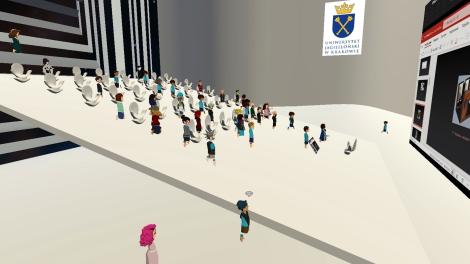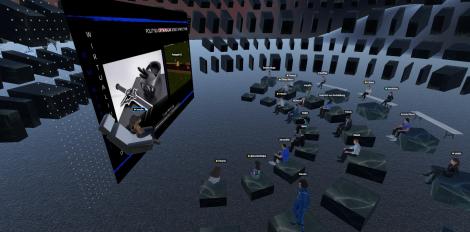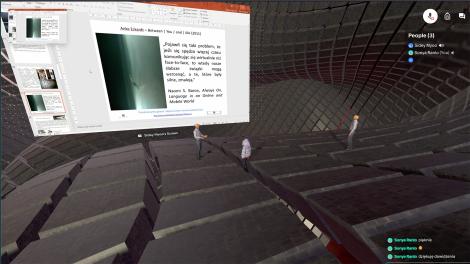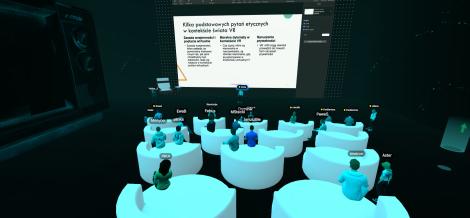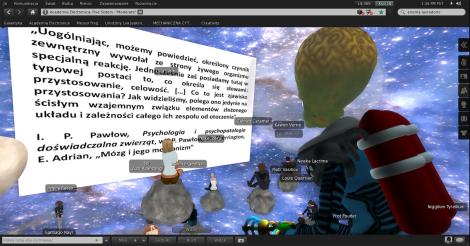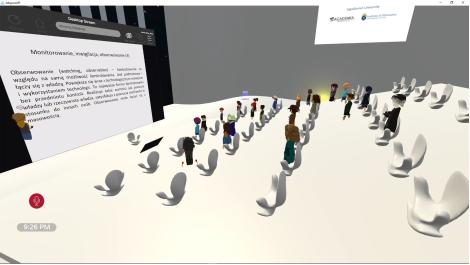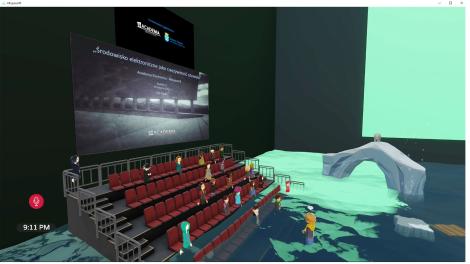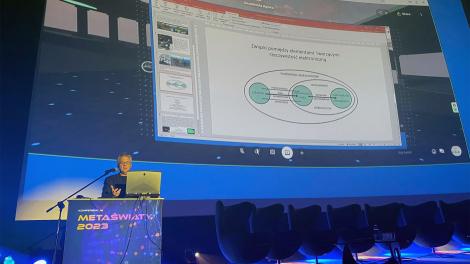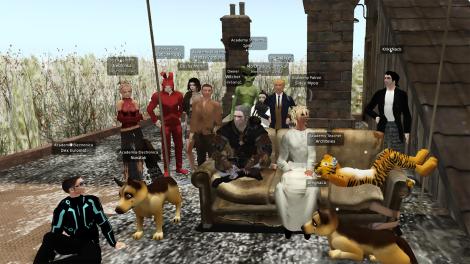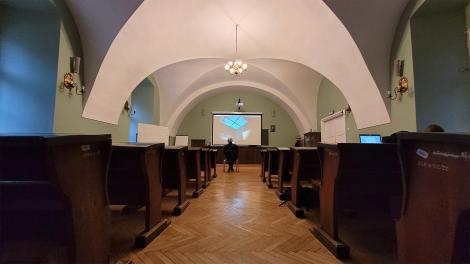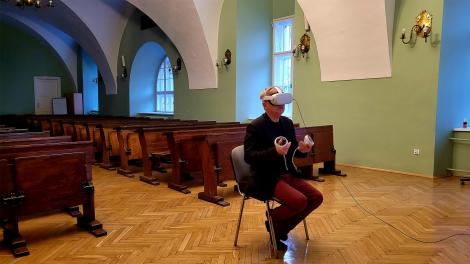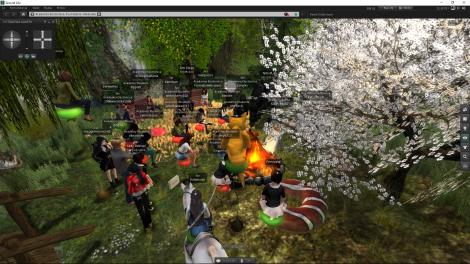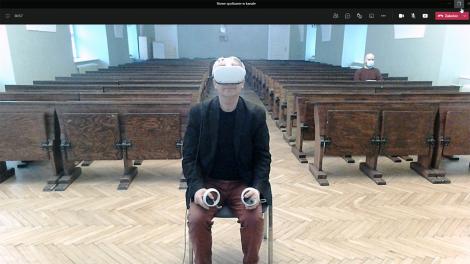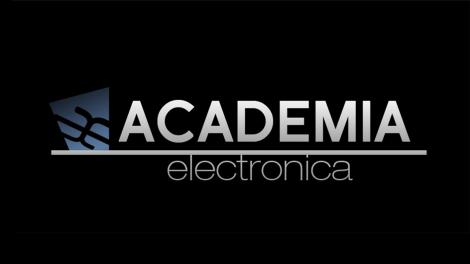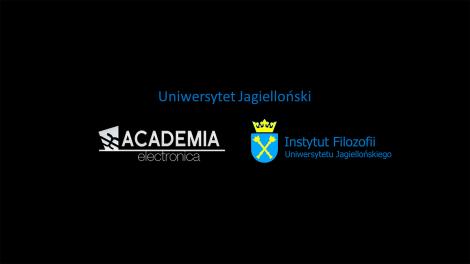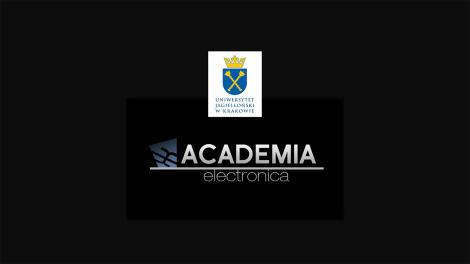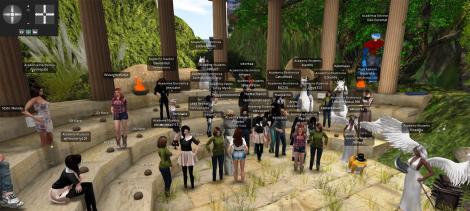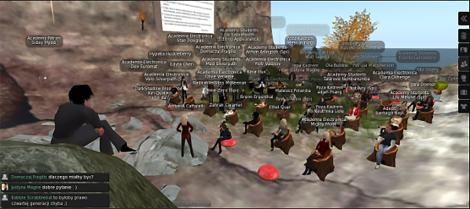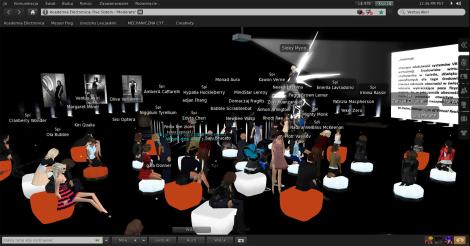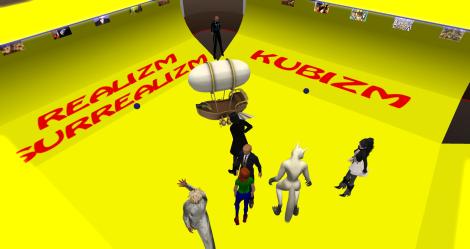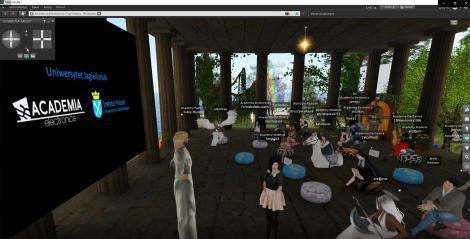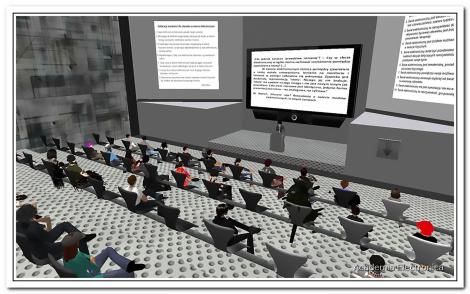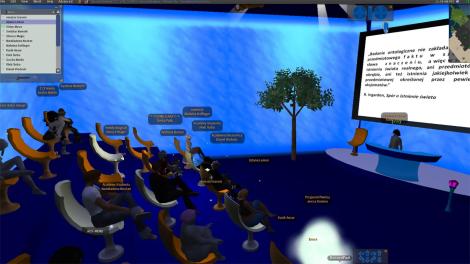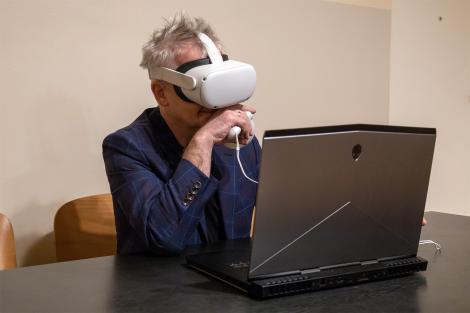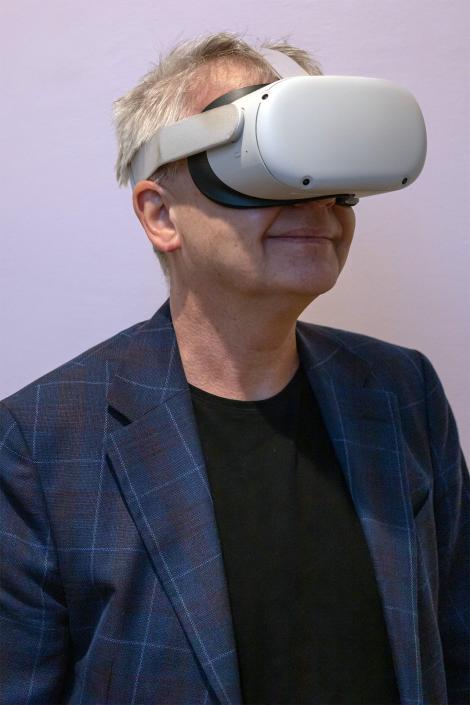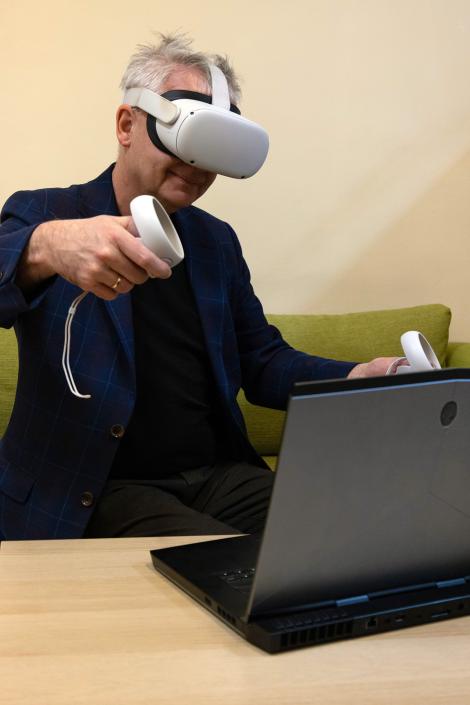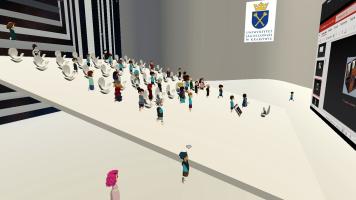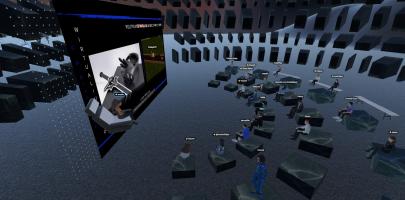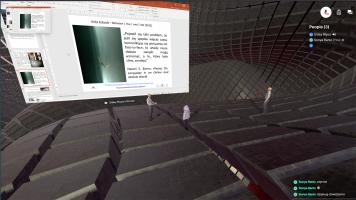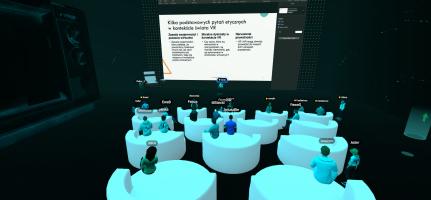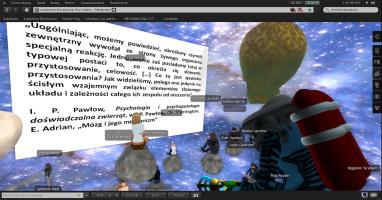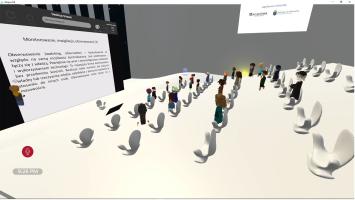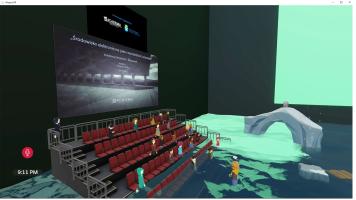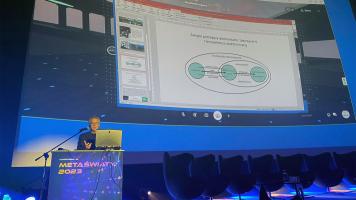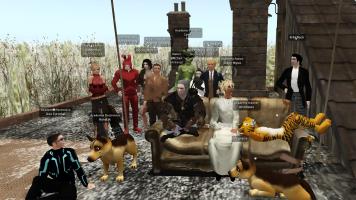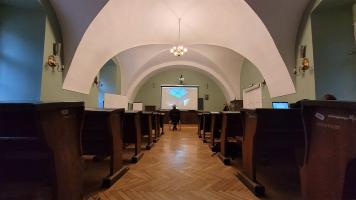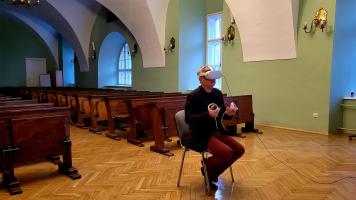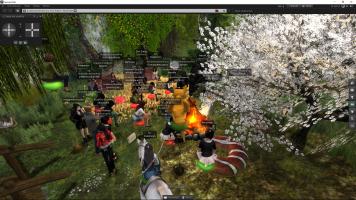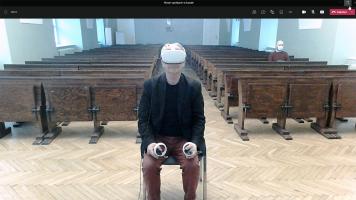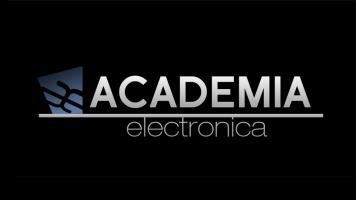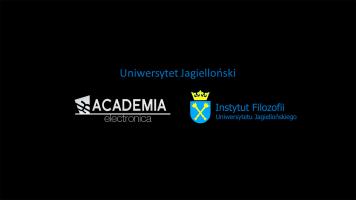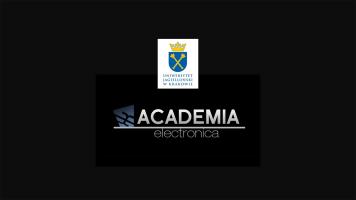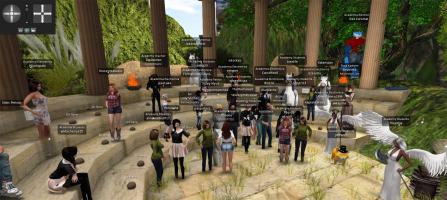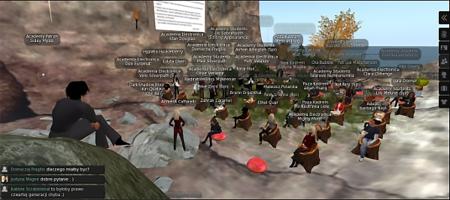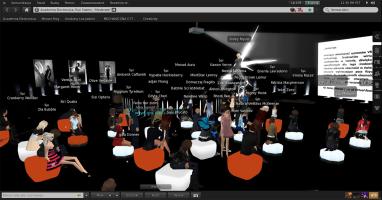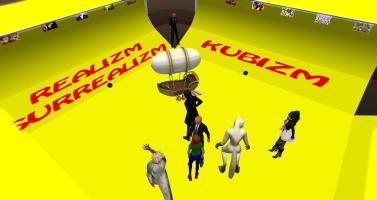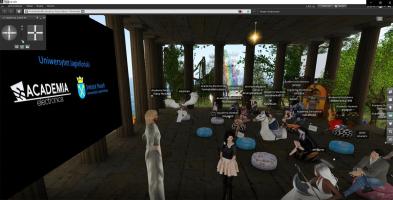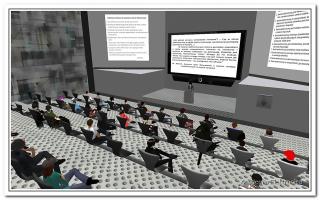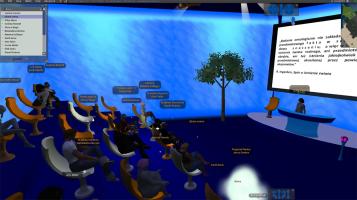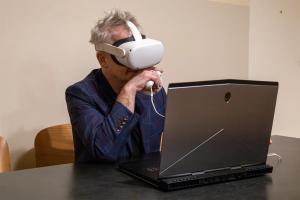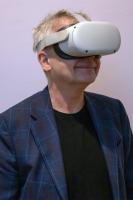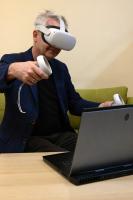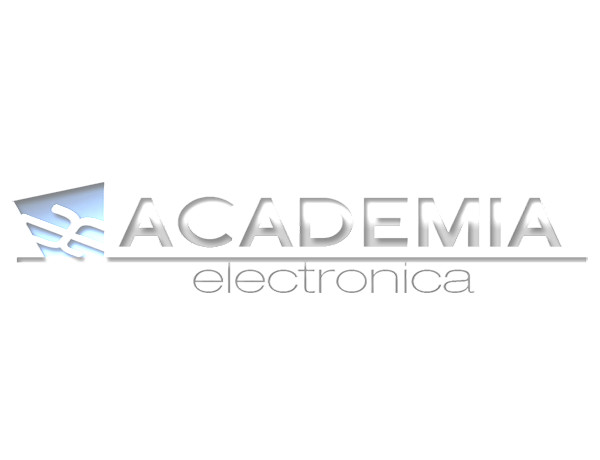
Academia Electronica is an open part of the Jagiellonian University operating in virtual reality. It has been operating continuously since 2007 and has been operating in the Spatial virtual world since March 2022. Academia is a research and teaching, innovation and development facility, serving in a fundamental sense the interdisciplinary research of virtual reality.
Academia Electronica is the result of Sidey Myoo's research on virtual reality since its inception in the 1990s. Academia is an example of the practical application of research stemming mainly from the analysis contained in ontoelectronics - an ontology directed towards virtual reality, where VR is treated as an alternative sphere of being to the physical world. The research also takes into account a futurological analysis concerning the distinction of paradigms shaping contemporary and future reality, including the postulate that virtual reality will be expanded and enriched by the development of technology and the increasing transfer of human activity to the web. At Academia, interdisciplinary research is carried out by scientists representing fields ranging from the information sciences to the broader humanities. This research is mainly directed at contemporary developments in science in connection with technology, including, for example, media, cyberculture, artificial intelligence and virtual reality, together with phenomena such as immersion, telepresence, tele-existence or participation.
Scientific activity at Academia has always been a priority, taking into account the novelty and freedom of scientific expression, its cognitive values and the ability to scientifically observe and integrate its results into the developmental mechanisms of the modern world. Academic activity is geared towards the progressive development of science, the uninterrupted pursuit of discovery and the outlining of postulates that may become leading and developed ideas in the future. To this end, among the various methods used by scientists, philosophical methods are employed, including consideration of the meaning of postulates about existence, the status of truthfulness resulting from the evaluation of the content under study, and ethical valuation. Methodologies such as, for example, cybernetics or chaos theory, all methods of rationalised intuition, mainly apriori methods or participatory observation, are used, as well as various forms of knowledge presentation, and research results related to, for example, remote education are immediately incorporated experimentally into experience. With its focus on innovation, Academia creates the conditions for multi-directional analyses and the postulation of conclusions indicating scientific discovery and the development of knowledge.
The intention behind Academia's existence is to create and introduce a university in the Metaverse - the university of the future - and to set the course for the development of education with the emergence of interuniversity studies in VR, created by profiling courses with a selection of courses available at the universities.
The questions are fundamental, but the answers turn out to be more important at some point
The Academia has brought together a number of academics from both the Jagiellonian University and other academic centres in Poland, who either teach their courses there or have participated in the From Student to Professor lecture series, as well as academics from foreign centres who have spoken in the Science Beyond Borders - The Global Electronic Academy series. Hundreds of students have passed through the virtual halls in Second Life (since 2008), AltSpaceVR (2020-22) and Spatial (since 2022), not infrequently voicing their postulates, which were developed into scientific articles or graduation papers.
In 2008, the first official academic course The Electronic Environment as a Human Reality was conducted there. The first defences in Poland, on the open Web, of a PhD (2012), a master's degree (2012) and a bachelor's exam (2015) were conducted here. Three editions of, Poland's first, remote academic conference, Philosophy of Technology (Second Life, 2013-15), in which participants acted as avatars, were organised here, followed in 2018 and 2019, also in Second Life, by the conferences Man in the Technological World, the latter of which had an international character. In 2022 (AltSpaceVR) and 2023 (Spatial), two more national scientific conferences took place, the first in VR using Oculus, Wirtualium I and Wirtualium II.
In 2022, the first MA exam in VR using Oculus was conducted at Academia, in the virtual world of Spatial. Since 2015, the Philosophy of Technology Section of the Jagiellonian University Philosophy Students' Scientific Circle has been active at Academia, bringing together young scientists, which involves giving lectures, refereeing literature or presenting their own views in the form of scientific projects. Between 2015 and 2020, the Academia operated in Second Life, the first bot in the world to conduct an official test exam, as well as continuing exhibition activities in the Academic Art Galleries.
Academia has been presented at a number of congresses and conferences in Poland and abroad, and is the first university delegation of its kind in VR in Poland, if not the world.
There is also a well-developed cooperation with other academic centres, which has been expressed for years in the ongoing activities at the Institute of Philosophy at the Jagiellonian University, from which Academia grows, as well as in cooperation with other academic centres, e.g. the Department of Cognitive Science at the Jagiellonian University, the Institute of Sociology at the Jagiellonian University, the Institute of Audiovisual Arts at the Jagiellonian University, the Jagiellonian Centre for Digital Humanities, the Department of Information and Digital Culture at the Maria Curie-Skłodowska University in Lublin and the Department of Information Technology and Media at the AGH University of Science and Technology in Krakow. Academia has attracted the interest of an international group of participants working within the Horizon grant, The Communities and Artistic Participation in Hybrid Environments (CAPHE, 2023-26), which is run at Jagiellonian University.
For several years, Academia has been co-founded by two volunteers: Jolanta Chowańska (RL) | Neutrinka Lisle (Netname) and Dominik Undak | Dex Euromat (Netname), M.Sc., who provide its virtual persona and technical facilities. Thanks are also due to the many people known only by their netname who have contributed to its existence, making Academia the result of the involvement of a number of communities, not only academics.
Students are welcome to take courses at the Academia and lecturers are welcome to teach and do research as well as organise various events within the Academia.
10 Truths about the Electronic World
- The Electronic World is an alternative reality in relation to the physical world.
- The Electronic World is a human world, capable of accommodating human dimensions: emotions, feelings, and spiritual values.
- The Electronic World is a reality accepting the transfer of all kinds of human life activity, it is a source of self-creation and autonomous creation, personal investigation and expression.
- The Electronic World is a source of new possibilities, different from those existing in the physical world.
- The Electronic World can provide the area and objectives of existential choices and human decisions concerning the reality in which persons want to experience their lives.
- The Electronic World is immaterial and develops a space different from physical world.
- The Electronic World expands its capacities in line with technological advances.
- The Electronic World develops faster than the physical world, influencing the evolution of human being.
- The Electronic World is not a simulation and there is no space for simulation in it.
- The Electronic World is reality, the game occurs in the physical world.
Sidey Myoo
Declaration of morality for a human in the Electronic World
- Your electronic identity contains your conscience.
- When you enter the electronic world, you are entering a world where real, objective, moral values exist.
- Once you assume your Net Name, you acquire a freedom impossible in the physical world and become responsible for the morality of your electronic portrait.
- The other electronic identities coexisting with you are real people.
- Your actions in the electronic world will involve real consequences, sometimes stretching further than in the physical world.
- When you do wrong in the electronic world, you hurt the other human emotionally, not physically.
- An electronic identity can change a human in the physical world and be a source of personal experience.
Sidey Myoo
Hosted courses at Academia Electronica, in Second Life or Spatial:
Sidey Myoo:
Środowisko elektroniczne jako rzeczywistość człowieka (filozofia)
Estetyka B – wykład/ćwiczenia (filozofia)
Sztuka elektroniczna (filozofia)
Filozofia Sieci (filozofia/kognitywistyka)
Główne problemy estetyki współczesnej (polonistyka)
Komunikacyjne technologie przyszłości (socjologia)
Historia Filozofii (polonistyka)
dr hab. Jakub Petri
CAPHE
Academia współpracuje z międzynarodowym gronem uczestniczek_ków działających w ramach grantu Horizon, The Communities and Artistic Participation in Hybrid Environments (CAPHE, 2023-26), który prowadzony jest na Uniwersytecie Jagiellońskim.
Konferencja Wirtualium 3.0:
Strona organizatorów na Facebooku
Przygotowywana jest trzecia edycja konferencji Wirtualium 3.0 (maj/czerwiec), która zaplanowana jest w całości w VR, w Academia Electronica w Spatial. W poprzednich dwóch edycjach wygłoszono kilkadziesiąt referatów przy udziale ponad 30 ośrodków akademickich.
Polskie Towarzystwo Estetyczne
W semestrze letnim 2023-24, w Academii w Spatial zaplanowano cykl pięciu hybrydowych seminariów, pod wspólnym tytułem Doświadczenie estetyczne w czasach Czwartej Rewolucji Przemysłowej.
Program seminariów:
1. Lublin, Uniwersytet Marii Skłodowskiej-Curie, Wydział Filozofii i Socjologii.
Tytuł: Początki przemian doświadczenia estetycznego sztuki na przełomie XX i XXI wieku. Termin: 12 stycznia 2024. Prowadząca: Liliana Kozak
2. Warszawa, Tytuł: Doświadczenie realności metawersów w kontekście pojęcia mimesis: rekwizyt, matryca czy przystosowanie umysłu? Termin: 9 lutego 2024. Prowadząca: dr Bogna J. Gladden-Obidzińska
3. Łódź, Uniwersytet Łódzki Tytuł: Wirtualizacja street artu i jej estetyczne konsekwencje. Termin: 8 marca 2024. Prowadząca: dr hab. prof. UŁ Agnieszka Gralińska-Taborek
4. Szczecin, Zachodniopomorski Uniwersytet Technologiczny Tytuł: Doświadczenie estetyczne w dobie Czwartej Rewolucji Przemysłowej a lęk technologiczny. Termin: 12 kwietnia 2024. Prowadząca: dr Joanna Szczepanik
5. Gniezno, Uniwersytet Adama Mickiewicza w Poznaniu, Instytut Kultury Europejskiej. Tytuł: Estetyczne aspekty sztucznej inteligencji a przeobrażenia współczesnej praktyki artystycznej Termin: 10 maja 2024. Prowadząca: dr Sylwia Szykowna
Sekcja Filozofii Techniki Koła naukowego Studentów Filozofii UJ:
Strona na Facebooku
Defending academic papers in virtual worlds
Master's degree defence at Academia Electronica in Spatial, Digital Beam auditorium: https://youtu.be/2fXtiybH82QUJ Digital Humanities Fair
19–20 stycznia 2024
Wydział Filologiczny, al. Mickiewicza 9B, Collegium Paderevianum, V piętro


